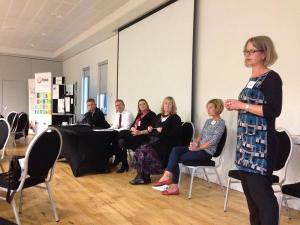News
Co-production key to public involvement in public health

Research that starts with questions drawn from both academics and participants is more likely to address patient needs than questions driven by academics, funders or institutions.
This was the feedback from a Fuse event (pictured) on patient and public involvement that has been published in a letter on the Quality & Safety section of the British Medical Journal (BMJ) website.
Fuse researchers wrote the letter in response to a paper by Professor Martin Marshal at University College London highlighting the ‘Researcher-in-Residence’ model as a way of engaging academics and practitioners in the promotion of evidence-informed service improvement.
Professor Martin’s paper was raised as an example of stakeholder participation by a speaker at the Fuse Quarterly Research Meeting (QRM) on patient and public involvement in public health and participants gave useful feedback about many of the core issues raised, and these are reflected in the letter.
Below are the key message from the letter:
- 'Researcher in Residence' models are suggested as a means of co-engaging academics and practitioners in the promotion of evidence-informed service improvement. But participants at our event raised questions about public involvement as key stakeholders from earlier on in the research process.
- In the experience of our presenters and participants, research that starts from questions derived from both academics and participants (i.e. that is co-produced) is more likely to address patient needs than questions driven by academics, funders or institutions.
- Public stakeholders at our event expressed hunger to know how to engage with academia, but felt the opportunities to do so in public health were unclear. There is much to learn from wider initiatives to promote Patient and Public Involvement (PPI) in research.
- Effective patient and public involvement (PPI) requires difficult conversations about vested interests and power and status among stakeholders.
- The relocation of public health responsibilities to local government raises questions about the different cultures of research and evidence use, the place of public involvement and democratic accountability, and how to use opportunities to address the social determinants of health.
- Some underlying (though not comprehensive) principles to guide meaningful PPI in research include the need to; clarify motives; reach out to marginalised groups; use existing networks; take account of context; be reflexive and adaptive; value different forms of knowledge and expertise; be committed to the possibilities of facilitating change.
- The conference opened a black box of similarities and contrasts between PPI in public health and clinical settings - requiring different approaches.
- The researcher in residence model introduced by Marshall et al (2014) is one approach to co-production. However, we argue that early involvement in setting research agendas is more likely to meet the needs of the public.
- New ways of doing research must have co-production at their core - they must be collaborative and engage stakeholders from the start of the research process, when questions are being formulated, through to dissemination.
To read to letter in full visit the BMJ website.
The letter was written by Keiran Conaty, Val Bryant and Fuse staff members Duika Burges Watson, Mandy Cheetham and Avril Rhodes.
All authors were members of the organising committee for the Fuse Quarterly Research Meeting: Beyond tokenism: PPI with impact Enriching patient and public involvement in public health research, which took place in Newcastle on 16 October 2014.
Fuse is holding an event about the challenges and opportunities of embedded research in public health on 15 June at Darlington Campus, Teesside University.
Last modified: Tue, 12 May 2015 13:38:31 BST
